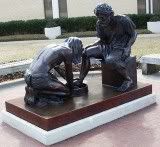Dearly beloved, we are gathered here today ...
I came across an article with some practical tips for preaching a funeral:
- First, spend time with the family of the deceased.
- Second, when you preach keep it short — 12-15 minutes top — unless the family asks you otherwise.
- Three, share the Gospel without fail.
- Fourthly, be the last one to leave.
- Lastly, touch base with the family one week after the funeral.
Do you have any other suggestions or lessons you've learned in doing funerals, or having seen them done?
Any funny or otherwise interesting stories regarding funeral services?
Any particular format you use or favorite Scripture passages or other readings?



7 comments:
(1) I have a sheet that I fill out when I meet with the family so that I make sure not to miss anything. I begin by confirming details and then ask questions in a number of different areas.
I think it is important to make funeral services "personal." I have done many funerals for people I didn't know, but was usually able to include personal information.
(2) In terms of funny stories I was doing a funeral when my boys were 4-5. They were in attendance sitting in the back with my wife. All of a sudden, I heard my four year old yell, "Yes!" When the funeral was over, I asked, what in the world was that? Allison said, "Dad - - Ben has never beaten Christopher at tic tac toe before and he beat him today and he forgot where he was at and yelled."
That is great advice.
Chris,
I would LOVE to see that sheet!
Gunny, I am pasting in the areas I cover - - I think that it would be great if every aspiring pastor had outlined a funeral sermon from (1) Psalm 23 (2) John 14:1-6 and (3) John 11.
I can't tell you how many times I have read those passages to people dying or to the families of someone who has died. It is one of the great privileges of any pastorate to be able to say that Jesus is the resurrection and the life.
As for "the sheet," I've pasted below.
Of course, the first thing I do when meeting with the family pray and do my level best to communicate the love of Christ.
I then tell them, we have two broad purposes. (1) To appropriately be thankful for the gift that your (loved one) has been. This is your chance as a family to share with others why you are thankful for him/her. (2) To be encouraged by the truth of the Word of Christ. You don't need hollow words or sentimentality. You need to hear from God and the Bible is God's Word. (I usually repeat these purposes in the opening of the funeral when I thank people for coming on behalf of the family).
I then say, "let me confirm that I have the details right."
When and Where:
Graveside:
Will there be a luncheon at church? If so, how many would you expect for the luncheon?
Will anyone else be sharing during the eulogy (the part where we remember the loved one)?
What music you would like included?
Is there any Scripture would you like included?
What would you like to be said about your loved one at the funeral?
Are there any stories that are great memories for your families, times that you shared together?
What did he/she like to do for fun?
Tentative order of service:
Review that what will happen at graveside - that it is a committal service - - and that it will be relatively short.
The final questions are the ones where we really begin to talk about spiritual things. If they tell me that they would like for me to choose the Scripture, then I usually get the chance to talk to them about passages like John 11, John 14, etc.
It also helps me to make sure I keep good notes/files on the people in our flock. I make it a goal to hear their stories and then to make notes in a file.
It means the world to family members to know that you really knew their loved one and his/her story.
This link shows how I wrote down one story I heard:
http://gotpreaching.wordpress.com/2008/02/03/a-slice-of-stillman-valley/
I keep a "grief calendar," where I log the date of death, then send a card to the family the next year, when everyone else has forgotten. I sometimes even do this two or three years after, accompanying the cards with prayers
Families really appreciate this.
I use Ecclesiastes 7:1-4 for the sermon part when I don't know the deceased, and especially don't know the spiritual condition of such. It often provides good fodder for "Why are we here today?" and "What lies ahead?"
Chris, thanks for sharing those great insights.
I've not done all that many funerals, so I'm always open to suggestion.
Lance, I really like your "grief calendar" idea as well. Thanks for the tip.
Post a Comment